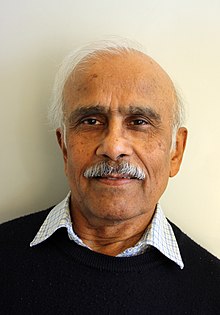This article has multiple issues. Please help improve it or discuss these issues on the talk page. (Learn how and when to remove these messages)
|
| Saral Sarkar সরল সরকার (Bengali) | |
|---|---|
 Sarkar in 2010 Sarkar in 2010 | |
| Born | (1936-05-10) 10 May 1936 (age 88) Kalimpong, Province of Bengal, British India (now West Bengal, India) |
| Occupation | Writer, Academic, Activist |
| Language | German, English |
| Notable works | Eco-Socialism or Eco-Capitalism? – A Critical Analysis of Humanity's Fundamental Choices |
| Spouse |
Maria Mies
(m. 1976; died in 2023) |
Saral Sarkar (Bengali সরল সরকার), born 10 May 1936 in West Bengal, is an Indian-German academic and eco-socialist political activist. Sarkar taught at the Goethe Institute in Hyderabad from 1966 to 1981, as a lecturer in German. Since 1982, Sarkar has been based in Cologne, and has been a prominent figure in the European ecology and peace movement. Sarkar was also the secretary of the local Green Party of Cologne. In the 1980s, The United Nations University commissioned Sarkar to conduct an authoritative study of the Green movement in West Germany. His resultant two-volume study, Green-Alternative Politics in Federal Republic of Germany was published in 1993. Sarkar was prominent in the anti-globalization movement from 1997 to 2005 and in active in political debate. Sarkar's writings, in both English and German have been widely disseminated in numerous journals and his works have been published in English, Chinese, French and German.
Personal life
From 1976, Sarkar was married to the sociologist Maria Mies, until her death in 2023.
References
- Patrick Harrington; Terry Burgoyne (1 August 2006). Counter Culture Anthology. Lulu.com. pp. 82–. ISBN 978-1-84728-118-0.
- ICSSR Journal of Abstracts and Reviews: Sociology and social anthropology. National Publishing House. 2000.
- Lokayan Bulletin. Lokayan. 1995.